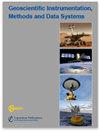Testing a novel sensor design to jointly measure cosmic-ray neutrons, muons and gamma rays for non-invasive soil moisture estimation
IF 2.3
4区 地球科学
Q3 GEOSCIENCES, MULTIDISCIPLINARY
Geoscientific Instrumentation Methods and Data Systems
Pub Date : 2024-01-16
DOI:10.5194/gi-13-9-2024
引用次数: 0
Abstract
Abstract. Cosmic-ray neutron sensing (CRNS) has emerged as a reliable method for soil moisture and snow estimation. However, the applicability of this method beyond research has been limited due to, among others, the use of relatively large and expensive sensors. This paper presents the tests conducted on a new scintillator-based sensor especially designed to jointly measure neutron counts, muons and total gamma rays. The neutron signal is first compared against two conventional gas-tube-based CRNS sensors at two locations. The estimated soil moisture is further assessed at four agricultural sites, based on gravimetric soil moisture collected within the sensor footprint. Muon fluxes are compared to the incoming neutron variability measured at a neutron monitoring station and total gammas counts are compared to the signal detected by a gamma ray spectrometer. The results show that the neutron dynamic detected by the new scintillator-based CRNS sensor is well in agreement with conventional CRNS sensors. The derived soil moisture also agreed well with the gravimetric soil moisture measurements. The muons and the total gamma rays simultaneously detected by the sensor show promising features to account for the incoming variability and for discriminating irrigation and precipitation events, respectively. Further experiments and analyses should be conducted, however, to better understand the accuracy and the added value of these additional data for soil moisture estimation. Overall, the new scintillator design shows to be a valid and compact alternative to conventional CRNS sensors for non-invasive soil moisture monitoring and to open the path to a wide range of applications.测试新型传感器设计,以联合测量宇宙射线中子、μ介子和伽马射线,从而实现无创土壤湿度估算
摘要宇宙射线中子探测(CRNS)已成为土壤水分和积雪估算的一种可靠方法。然而,由于使用相对较大和昂贵的传感器等原因,这种方法在研究之外的适用性受到了限制。本文介绍了对基于闪烁体的新型传感器进行的测试,该传感器专门设计用于联合测量中子计数、μ介子和伽马射线总量。首先在两个地点将中子信号与两个传统的基于气管的 CRNS 传感器进行了比较。根据在传感器覆盖范围内收集到的土壤水分重力测量值,在四个农业地点对估计的土壤水分进行了进一步评估。μ介子通量与中子监测站测量到的入射中子变化进行了比较,伽马总计数与伽马射线光谱仪检测到的信号进行了比较。结果表明,基于闪烁体的新型 CRNS 传感器检测到的中子动态与传统 CRNS 传感器完全一致。得出的土壤水分与土壤水分重力测量结果也十分吻合。该传感器同时探测到的μ介子和伽马射线总量显示出很好的特性,可分别用于解释入射变化以及区分灌溉和降水事件。不过,为了更好地了解这些额外数据对土壤水分估算的准确性和附加值,还需要进行进一步的实验和分析。总之,新的闪烁体设计表明,在非侵入式土壤水分监测方面,它是传统 CRNS 传感器的有效和紧凑的替代品,并为广泛的应用开辟了道路。
本文章由计算机程序翻译,如有差异,请以英文原文为准。
求助全文
约1分钟内获得全文
求助全文
来源期刊

Geoscientific Instrumentation Methods and Data Systems
GEOSCIENCES, MULTIDISCIPLINARYMETEOROLOGY-METEOROLOGY & ATMOSPHERIC SCIENCES
CiteScore
3.70
自引率
0.00%
发文量
23
审稿时长
37 weeks
期刊介绍:
Geoscientific Instrumentation, Methods and Data Systems (GI) is an open-access interdisciplinary electronic journal for swift publication of original articles and short communications in the area of geoscientific instruments. It covers three main areas: (i) atmospheric and geospace sciences, (ii) earth science, and (iii) ocean science. A unique feature of the journal is the emphasis on synergy between science and technology that facilitates advances in GI. These advances include but are not limited to the following:
concepts, design, and description of instrumentation and data systems;
retrieval techniques of scientific products from measurements;
calibration and data quality assessment;
uncertainty in measurements;
newly developed and planned research platforms and community instrumentation capabilities;
major national and international field campaigns and observational research programs;
new observational strategies to address societal needs in areas such as monitoring climate change and preventing natural disasters;
networking of instruments for enhancing high temporal and spatial resolution of observations.
GI has an innovative two-stage publication process involving the scientific discussion forum Geoscientific Instrumentation, Methods and Data Systems Discussions (GID), which has been designed to do the following:
foster scientific discussion;
maximize the effectiveness and transparency of scientific quality assurance;
enable rapid publication;
make scientific publications freely accessible.
 求助内容:
求助内容: 应助结果提醒方式:
应助结果提醒方式:


